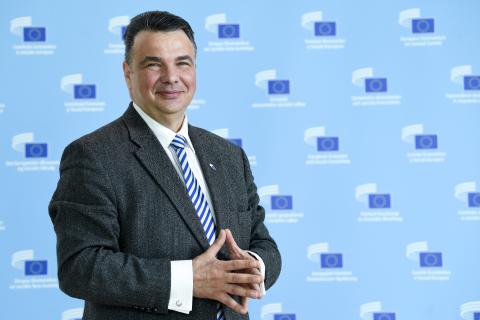European Economic
and Social Committee
EU-India Strategic Partnership, a new chapter …
As the EU is looking to expand its circle of key partners against a backdrop of uncertainty over transatlantic relations, India seems a perfect ally, being the largest formal democracy in the world, with market and economic growth (including in green technology) that represent a valuable opportunity for EU companies. The World Bank expects India to overtake Japan and Germany and emerge as the world’s third-largest economy by 2030.
India's strategic geographical position in the heart of the Indo-Pacific, through which about 80% of the total volume of global trade passes, makes it a key partner for maintaining the security of the region and the freedom of navigation that are crucial to EU interests.
For some time, the EU and India have been negotiating a free trade agreement, an investment protection agreement and an agreement on geographical indications. They also collaborate on a wide range of policies, including security, climate and energy, connectivity, research and innovation, and space. However, the partnership has not yet reached its full potential and the geopolitical urgency might give it fresh impetus.
In recent years, India, which maintains a privileged relationship with Russia and is strengthening ties with the Trump administration, has developed a relationship with several EU countries in the field of security. In particular, New Delhi has built a robust partnership over the decades with France, the only EU country with territories and a permanent military presence in the Indo-Pacific. India has been one of France's main armaments partners for many years. Through an Annual Defence Dialogue (at Defence Minister level) and the High Committee on Defence Cooperation (at State Secretary level), France and India agreed Horizon 2047, a roadmap to prepare for the centenary of their bilateral relations.
Other EU countries have developed strategic partnerships with New Delhi, including Italy, Germany, Spain and Sweden, and have started to develop defence cooperation with India. Some analysts believe that the absence of a formal EU institutional framework is hampering development of EU-India military collaboration. They propose including India in the European Defence Fund and establishing a formal bilateral military partnership.
The Commission's recent visit to India is a clear indication of the EU strategic upgrade of the relationship with India. The EESC opinion underlines the need for a new, ambitious roadmap geared to the current political and strategic circumstances.
The European Commission must urgently step-up negotiations with India on a Free Trade Agreement with a view to establishing India as one of the EU's preferential strategic partners, expanding cooperation in all fields, further promoting fair, inclusive and rules-based international trade, and building on the shared history and values of our ancient civilisations and on our common understanding of contemporary realities.
The EESC recommends furthering cooperation between the EU and its Member States and India on bilateral and multilateral projects on infrastructure, construction – especially deep‑water ports and airports – and energy connectivity.
There is a clear case for deepening cooperation between the EU and its Member States and India on defence and security, especially in the R&D and innovation sector, including joint space and dual use projects, with special focus on the contribution of small and medium‑sized enterprises (SMEs).
The EESC also calls on the European Council, the European Commission and the EU Member States to urgently reactivate the EESC’s EU-India Round Table and involve civil society.
Work organisation
Downloads
-
EU-India Strategic Partnership, a new chapter …
